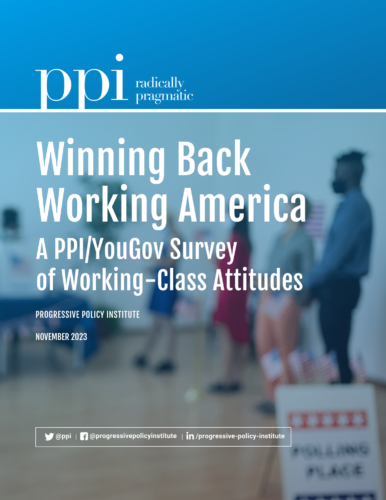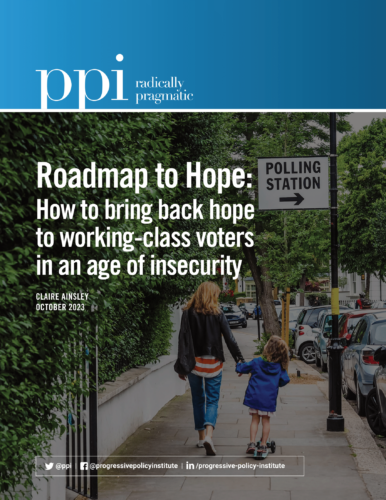Washington, D.C. — Working Americans believe the last 40 years have not been kind to them. When surveyed in a new poll, a majority of working-class voters believe they are worse off. When asked which President from the past 30 years has done the most for average working families, voters choose Donald Trump by a wide margin (44% to Biden’s 12%). While the result is mainly driven by partisan divides, 51% of independents chose Trump.
Working-class voters are a crucial demographic in competitive districts across the country and Democrats must make further inroads with working-class voters in order to build on recent election victories and assemble a winning coalition for 2024.
Today, the Progressive Policy Institute’s (PPI) Project on Center-Left Renewal released a new poll commissioned by YouGov to help Democrats understand and frame more effective appeals to working-class voters. PPI President Will Marshall provides a summary and analysis of the results in the report “Winning Back Working America: A PPI/YouGov Survey of Working Class Attitudes.”
“In the last century, we’ve seen a populist revolt against dominant political parties rooted in working-class voters’ discontent with sweeping economic and cultural changes. Working Americans believe the last 40 years have been hard for them and do not believe that either party will handle the issues they care most about. Ahead of 2024, Democrats must reconnect with their historical working-class base,” said Will Marshall. “The recent PPI/YouGov poll on working-class Americans can give Democrats a blueprint for winning back working America and offering pragmatic, common-sense solutions to our country’s biggest problems.”
The poll contains two parts: a national survey of 860 non-college voters and oversamples of working-class opinions in seven 2024 presidential or Senate battleground states: Michigan, Montana, New Hampshire, Arizona, Georgia, Pennsylvania, and Nevada. The poll surveyed registered voters without a four-year degree (voters with a two-year degree, high school diploma, or less). Results from swing state polls are available upon request.
Key findings from the national poll:
• Two-thirds of voters say they are worse off and only 21% believe their lives have improved. White non-college voters are especially likely to say things have gotten worse (70%). Pessimism is even higher in many swing states: Arizona (74%), Michigan (74%), and Pennsylvania (75%).
• When presented with a list of reasons why life is harder today, respondents put illegal immigration and automation at the top.
• When it comes to the economy, voters polled overwhelmingly (69%) name the high cost of living as their top worry. In distant but still significant second place (11%) is the concern that government deficits and debt are too high.
• When asked why prices have risen so much, 55% of working-class voters picked “government went overboard with stimulus spending, overheating the economy” over the impact of the COVID recession and supply chain bottlenecks as the economy recovered. More than half of voters in each of the swing states agreed.
• When asked where they think their children will find the best jobs and careers, most voters (44%) chose the communications/digital economy over manufacturing (13%).
• When asked about student loan forgiveness, 56% of voters (including 59% of Independents) say “paying off this debt is not fair to the majority of Americans who don’t get college degrees…” Democrats were outliers, with only 28% calling loan forgiveness unfair.
• What the voters do support, enthusiastically and across political fault lines, is “more public investment in apprenticeships and career pathways to help non-college workers acquire better skills” (74%) as well as “affordable, short-term training programs that combine work and learning.”
• Overall, 41% of voters say climate change is an “existential” problem that demands action, while 34% expressed skepticism. 42% think clean energy incentives will create good jobs and boost the economy, while 37% fear they will raise energy bills and the costs of goods.
• When asked about education and whom public schools served most, they said political activists (31%), unions (30%) and students (29%), with only 10% choosing parents.
• When asked on views of the Federal Trade Commission’s lawsuit against Amazon and whether or not voters support ending Amazon Prime’s two-day prime shipping, 47% of voters strongly oppose.
• And when asked about protecting consumer’s personal data, 80% prefer the government to pass a privacy and data security bill and ensure all companies abide by these regulations instead of the 20% of voters who think the government should break up big tech companies.
Read the full poll and analysis here.

In October, PPI released the companion poll in a report from Claire Ainsley, Director of the Center-Left Renewal Project at PPI, titled “Roadmap to Hope: How to Bring Back Hope to Working-Class Voters in an Age of Insecurity” on opinions of the working class in the U.K.
The Progressive Policy Institute (PPI) is a catalyst for policy innovation and political reform based in Washington, D.C. Its mission is to create radically pragmatic ideas for moving America beyond ideological and partisan deadlock. Learn more about PPI by visiting progressivepolicy.org. Find an expert at PPI and follow us on Twitter.
###
Media Contact: Amelia Fox – afox@ppionline.org




